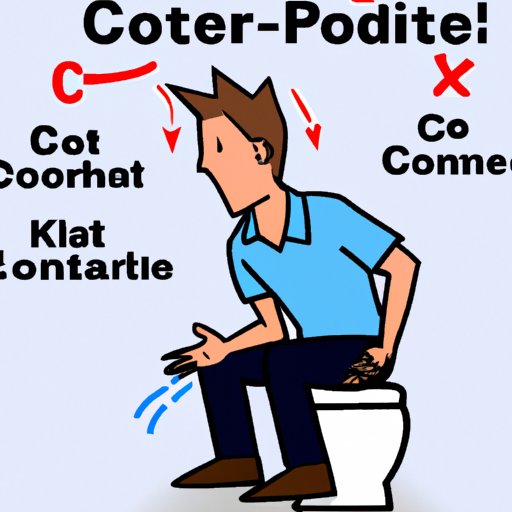Introduction
Constipation is a common digestive condition that affects many people. It occurs when the colon absorbs too much water from the food that passes through it, resulting in hard, dry stools that are difficult to pass. Constipation can cause abdominal pain and discomfort, bloating, and nausea.
This article will explore what to do if you are constipated. We’ll look at the causes of constipation, as well as treatments and preventative measures you can take to reduce the likelihood of constipation occurring.
Understand the Causes of Constipation
Before discussing treatments for constipation, it’s important to understand the potential causes. Constipation can be triggered by a number of different factors, including dietary, lifestyle, and medical conditions.
Dietary Causes
Dietary habits can play a major role in the development of constipation. Eating a diet low in fiber, not drinking enough fluids, and consuming large amounts of dairy products can all contribute to constipation. Additionally, some medications, such as antacids containing calcium or aluminum, can lead to constipation.
Lifestyle Factors
In addition to dietary habits, certain lifestyle choices can also contribute to constipation. Not getting enough exercise, leading a sedentary lifestyle, and not going to the toilet when needed can all make constipation worse. Stress and depression can also be a factor, as these can cause changes in bowel habits.
Medical Conditions
Certain medical conditions can cause constipation. These include thyroid disorders, diabetes, Parkinson’s disease, and irritable bowel syndrome (IBS). Additionally, some medications used to treat other medical conditions can cause constipation. It’s important to speak to your doctor if you think a medical condition or medication may be causing your constipation.
Increase Your Fiber Intake
Increasing your fiber intake is one of the most effective ways to treat constipation. Dietary fiber helps to keep the digestive system running smoothly, as it adds bulk to the stool and helps it move through the intestines more quickly.
Benefits of Fiber
Fiber can also help to improve overall health. A study published in the American Journal of Clinical Nutrition found that increasing fiber intake was associated with a reduced risk of cardiovascular disease, stroke, obesity, and type 2 diabetes. Furthermore, a meta-analysis of 16 studies published in the European Journal of Clinical Nutrition concluded that increased fiber intake was associated with a lower risk of colorectal cancer.
Sources of Fiber
There are two types of fiber: soluble and insoluble. Soluble fiber dissolves in water, while insoluble fiber does not. Both types of fiber are beneficial for preventing constipation. Good sources of soluble fiber include oats, legumes, nuts, and fruits, while good sources of insoluble fiber include whole grains, wheat bran, and vegetables.
Drink Plenty of Fluids
Drinking plenty of fluids is another important step in treating constipation. Dehydration can make constipation worse, as it can cause the body to absorb too much water from the food passing through the digestive system.
Importance of Hydration
Staying hydrated is important for overall health. According to a study published in the British Journal of Nutrition, adequate hydration is essential for maintaining physical performance, cognitive function, and mood. In addition, staying hydrated can help to flush toxins out of the body, boost metabolism, and improve skin health.
Water vs Other Fluids
Water is the best fluid for staying hydrated, as it doesn’t contain any calories or sugar. However, other fluids can also be beneficial, such as herbal teas, fruit juices, and vegetable juices. Just be sure to avoid drinks that are high in sugar, such as sodas and energy drinks.
Exercise Regularly
Regular physical activity can also help to reduce constipation. Exercise can stimulate the digestive system and help to move food through the intestines more quickly.
Benefits of Regular Exercise
Exercise offers numerous health benefits, beyond helping to reduce constipation. According to a study published in the Journal of the American College of Cardiology, regular physical activity can help to reduce the risk of heart disease, stroke, and type 2 diabetes, as well as improve mental health.
Types of Exercises
Any type of exercise can be beneficial, but aerobic exercises such as walking, running, swimming, and cycling are particularly effective for improving digestion. Additionally, Pilates and yoga can be helpful for strengthening the core muscles, which can help to improve posture and reduce strain on the digestive system.
Take a Natural Laxative
Natural laxatives can also be useful for treating constipation. Natural laxatives are typically derived from plants or herbs, and they work by either increasing the amount of water in the intestines or stimulating the muscles of the digestive system.
Different Types of Natural Laxatives
The most common types of natural laxatives are psyllium husk, aloe vera, prunes, flaxseeds, chia seeds, and senna. Psyllium husk is a soluble fiber that helps to add bulk to the stool and soften it, while aloe vera has a mild laxative effect. Prunes are high in fiber and contain sorbitol, a naturally occurring sugar alcohol that helps to draw water into the intestines. Flaxseeds and chia seeds are rich in omega-3 fatty acids and fiber, while senna is an herb that contains compounds called anthraquinones, which act as a natural laxative.
Safety and Effectiveness
Natural laxatives are generally safe and effective, but it’s important to speak to your doctor before taking them, as some people may be allergic to certain ingredients. In addition, natural laxatives should only be taken occasionally, as overuse can cause diarrhea and dehydration.

Talk to a Doctor About Medications
If natural laxatives aren’t enough to relieve constipation, your doctor may suggest taking medications. There are several types of medications available for treating constipation, such as stool softeners, osmotic laxatives, stimulant laxatives, and fiber supplements.
Different Types of Medications
Stool softeners work by helping the stool to retain water, making it easier to pass. Osmotic laxatives work by drawing water into the intestines, making the stool softer and easier to pass. Stimulant laxatives work by stimulating the muscles of the digestive system, while fiber supplements add bulk to the stool and help it to move through the intestines more quickly.
Potential Risks and Side Effects
Medications can be effective for relieving constipation, but they can also cause side effects. Common side effects include abdominal cramping, bloating, nausea, and dizziness. Additionally, long-term use of laxatives can lead to electrolyte imbalances, dehydration, and dependency. It’s important to speak to your doctor before taking any medications for constipation.
Conclusion
Constipation can be caused by dietary, lifestyle, and medical factors. To treat constipation, increase your fiber intake, drink plenty of fluids, exercise regularly, take natural laxatives, and talk to a doctor about medications. By following these steps, you can reduce the likelihood of constipation occurring and ensure optimal digestive health.
If you’re concerned about constipation, speak to your doctor for further advice and guidance. They’ll be able to recommend the best course of action for you, based on your individual needs and circumstances.
(Note: Is this article not meeting your expectations? Do you have knowledge or insights to share? Unlock new opportunities and expand your reach by joining our authors team. Click Registration to join us and share your expertise with our readers.)
